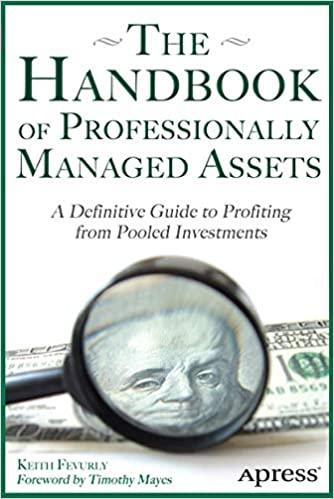Question
5. Option pricing - Single-period binomial approach The value of an option can be calculated by using a step-by-step approach in the case of single
5. Option pricing - Single-period binomial approach
The value of an option can be calculated by using a step-by-step approach in the case of single periods or by using sophisticated formulas that can be easily created through a spreadsheet. In the real world, two possible outcomes for a stock price in six months is an assumption. The stock markets are volatile, and stocks move up and down based on market- and firm-specific factors.
Consider the case of SolarSystems Inc.:
Shares of SolarSystems Inc., a manufacturer of solar panels, sells for $40.00. Existing options allow for the option holder to purchase one additional share at an exercise price of $30.00. (Assume that you get the option for free!) The option will expire within one year. We can assume that at that time there will be a 70% chance that SolarSystems Inc.s shares will sell for $56.00 and a 30% chance that the shares will be selling at $28.00.
Using the steps to the binomial approach, determine the following:
The expected end-term share price and return on SolarSystems Inc. shares are: .
Based on the binomial approach, the range of payoff values at expiration for SolarSystems Inc.s shares and options is:
$25.00 (share) and $20.00 (option)
$18.00 (share) and $15.00 (option)
$20.00 (share) and $30.00 (option)
$28.00 (share) and $26.00 (option)
Given this information, it is possible to create a riskless portfolio by selling one option and purchasing shares.
Assuming that the riskfree rate is 8% and is compounded daily, current option price (VCVC) of the call option is .
Step by Step Solution
There are 3 Steps involved in it
Step: 1

Get Instant Access to Expert-Tailored Solutions
See step-by-step solutions with expert insights and AI powered tools for academic success
Step: 2

Step: 3

Ace Your Homework with AI
Get the answers you need in no time with our AI-driven, step-by-step assistance
Get Started


